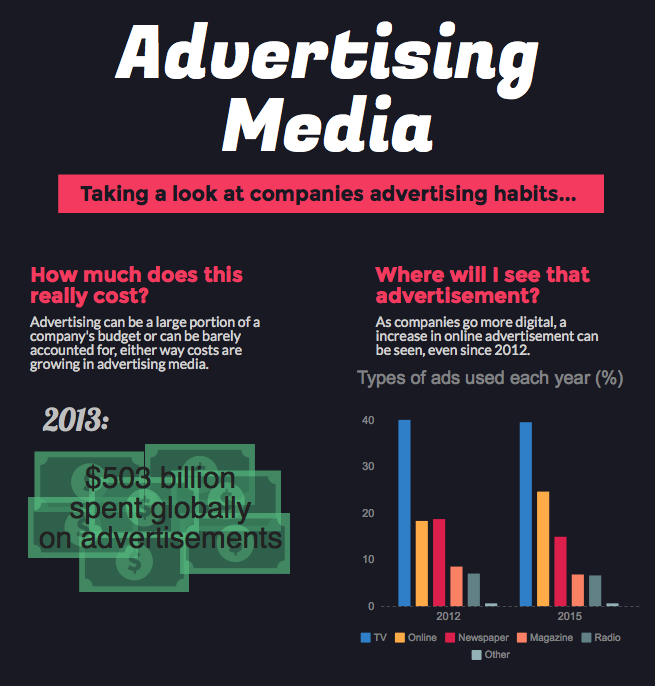The phrase “all media is good media” has been said and disputed for ages, but how much truth is actually behind it? Is it better to have people talking about something negative that someone did than not to be talking about them at all?
There are many different forms of media and the way media is displayed. Yet, media is often generalized into one large group.
Advertising media is used by almost all companies and organizations in order to paint a positive picture to their consumers. In 2013 alone, about $503 billion was spent globally on advertising media. This number continues to grow each year, especially for digital advertisement.
“It’s interesting because when you think about media for a company, you have your paid media which is commercials and different things like that, you have your own media, that’s how you’re owning your brand as far as your websites and your own Facebook page, and then your earned media which ironically is the most powerful and persuasive because it’s that word of mouth,” marketing instructor Tangi James-Boone said.
In advertising media, there are both creative aspects and more business-focused aspects. Marketers focus on the business aspects of the advertising process and look at the success of different advertising strategies, among other things.
“We’re taught that all feedback is good feedback,” sophomore marketing major Maureen Helm said. “If it’s a bad ad, people are still talking about it, but it depends. Is it a good ad because somebody didn’t do their job right, is it just not generating interest or hitting the target market they’re looking for, or is it a bad ad like a controversial ad? So I think you have to look at the two different aspects of that.”
“If they’re connecting with the experience and it’s something that’s positive, that’s great. Now you’ve got this momentum behind your product,” James-Boone said. “If it doesn’t and it’s something negative, then there’s much more mediation that needs to take place and customer service focus and getting people to either get to the truth or changing their perception.”
As the focus shifts in advertising media to a more digital form, marketers must look at the different ways in which they can fully engage with their more digital audiences as well. According to the Institute for Public Relations, 56 percent of executives report that digital engagement with their consumers has become at least a top 10 priority of theirs.
Many companies and organizations work to stay engaged by keeping an increased presence throughout social media. This way, they can engage with their consumers rather than simply presenting them with the information through old-form advertisements.
“Sometimes people who had a bad experience go on [Twitter] and they [the companies] replied ‘try to talk to a manager’ or ‘how can we help you?’ or ‘send us your e-mail,’” Helm said. “So, I think the companies really do care about the customer and their experience and they ultimately want them to like their company and get a good word-of-mouth.”
“Some companies answer on Twitter and I think that’s really great,” sophomore exercise science major Joe Fiore said. “I think that’s better than when a company just ignores it but also I think it’s a little unrealistic to expect a giant company to respond to every Twitter user who tweets at them.”
So, is all media really good media? Or, is negative publicity something that should be avoided at all costs?
“My initial response is that all is never ever all,” James-Boone said. “So, I think that media has its place and I think we’re walking a thin line right now in really figuring out what’s the best use of media to support those goals and objectives that not only organizations have in their brands but also really in the personal brands that we’re building.”
“I don’t think it’s true,” junior international business major Krissy Giles said. “I think there’s certain things that are up on the media that aren’t good like body shaming and things like that, that tell people that they aren’t good enough. I would say it’s definitely a mixture.”



